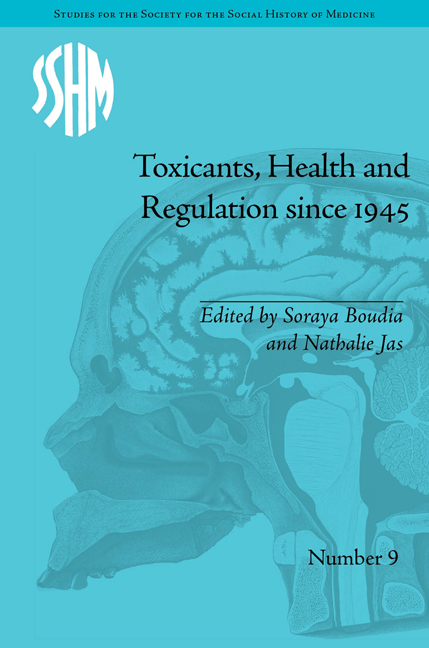Book contents
- Frontmatter
- Contents
- Acknowledgements
- List of Figures and Tables
- List of Contributors
- Introduction
- 1 The Cold War Over the Worker's Body: Cross-National Clashes Over Maximum Allowable Concentrations in the Post-World War II Era
- 2 Adapting To ‘Reality’: The Emergence of an International Expertise On Food Additives and Contaminants in the 1950s and Early 1960s
- 3 From Threshold to Risk: Exposure to Low Doses of Radiation and its Effects On Toxicants Regulation
- 4 ‘License To Expose’? Occupational Exposure Limits, Scientific Expertise and State in Contemporary France
- 5 Chemical Infrastructures of the St Clair River
- 6 Managing an Everlastingly Polluted World: Food Policies And Community Health Actions in the French West Indies
- 7 Chernobyl Empowerment? Exporting ‘Participatory Governance’ to Contaminated Territories
- Notes
- Index
2 - Adapting To ‘Reality’: The Emergence of an International Expertise On Food Additives and Contaminants in the 1950s and Early 1960s
- Frontmatter
- Contents
- Acknowledgements
- List of Figures and Tables
- List of Contributors
- Introduction
- 1 The Cold War Over the Worker's Body: Cross-National Clashes Over Maximum Allowable Concentrations in the Post-World War II Era
- 2 Adapting To ‘Reality’: The Emergence of an International Expertise On Food Additives and Contaminants in the 1950s and Early 1960s
- 3 From Threshold to Risk: Exposure to Low Doses of Radiation and its Effects On Toxicants Regulation
- 4 ‘License To Expose’? Occupational Exposure Limits, Scientific Expertise and State in Contemporary France
- 5 Chemical Infrastructures of the St Clair River
- 6 Managing an Everlastingly Polluted World: Food Policies And Community Health Actions in the French West Indies
- 7 Chernobyl Empowerment? Exporting ‘Participatory Governance’ to Contaminated Territories
- Notes
- Index
Summary
Introduction
On 1–5 November 2010, the World Health Organization (WHO) and the Food and Agriculture Organization (FAO) held a Joint Expert Meeting in Ottawa, Canada, with the support of the European Food Safety Authority (EFSA), Health Canada, the US National Institute of Environmental Health Sciences and the US Food and Drug Administration (FDA). The purpose was to ‘review toxicological and health aspects of Bisphenol A (BPA)’. This joint meeting was one of the many events marking a controversy that started in the US and spread to many Western countries and international organizations from the early 2000s. Some scientists and environmental health advocacy organizations are of the opinion that exposure to very low doses of xenoestrogen, which belongs to the new category of endocrine disruptors, can cause serious diseases. The fact that BPA is present in food has prompted anti-bisphenol activists to call for a ban. Regulatory agencies and industry argue that BPA is harmless ‘when used as intended’ and that populations’ exposure through contaminated food is ‘well below levels considered harmful’. The conclusions of the experts at the joint meeting were consistent with those of the firms producing and using BPA, which disregard any arguments put forward by scientists and environmental health movements. The latter group do not consider the tests implemented in the evaluations of the expert committees as ‘science’. They claim that science is bypassed altogether.
- Type
- Chapter
- Information
- Toxicants, Health and Regulation since 1945 , pp. 47 - 70Publisher: Pickering & ChattoFirst published in: 2014



